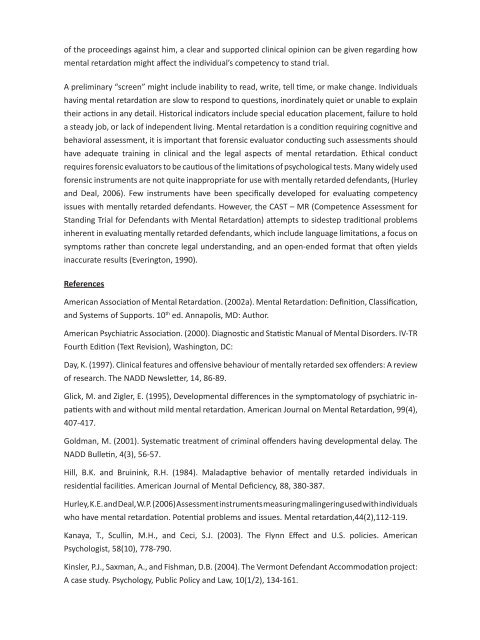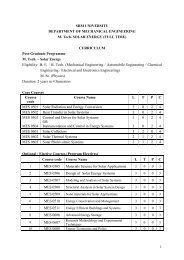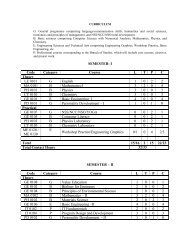âForensic Clinical Psychology as an Emerging ... - SRM University
âForensic Clinical Psychology as an Emerging ... - SRM University
âForensic Clinical Psychology as an Emerging ... - SRM University
Create successful ePaper yourself
Turn your PDF publications into a flip-book with our unique Google optimized e-Paper software.
of the proceedings against him, a clear <strong>an</strong>d supported clinical opinion c<strong>an</strong> be given regarding how<br />
mental retardation might affect the individual’s competency to st<strong>an</strong>d trial.<br />
A preliminary “screen” might include inability to read, write, tell time, or make ch<strong>an</strong>ge. Individuals<br />
having mental retardation are slow to respond to questions, inordinately quiet or unable to explain<br />
their actions in <strong>an</strong>y detail. Historical indicators include special education placement, failure to hold<br />
a steady job, or lack of independent living. Mental retardation is a condition requiring cognitive <strong>an</strong>d<br />
behavioral <strong>as</strong>sessment, it is import<strong>an</strong>t that forensic evaluator conducting such <strong>as</strong>sessments should<br />
have adequate training in clinical <strong>an</strong>d the legal <strong>as</strong>pects of mental retardation. Ethical conduct<br />
requires forensic evaluators to be cautious of the limitations of psychological tests. M<strong>an</strong>y widely used<br />
forensic instruments are not quite inappropriate for use with mentally retarded defend<strong>an</strong>ts, (Hurley<br />
<strong>an</strong>d Deal, 2006). Few instruments have been specifically developed for evaluating competency<br />
issues with mentally retarded defend<strong>an</strong>ts. However, the CAST – MR (Competence Assessment for<br />
St<strong>an</strong>ding Trial for Defend<strong>an</strong>ts with Mental Retardation) attempts to sidestep traditional problems<br />
inherent in evaluating mentally retarded defend<strong>an</strong>ts, which include l<strong>an</strong>guage limitations, a focus on<br />
symptoms rather th<strong>an</strong> concrete legal underst<strong>an</strong>ding, <strong>an</strong>d <strong>an</strong> open-ended format that often yields<br />
inaccurate results (Everington, 1990).<br />
References<br />
Americ<strong>an</strong> Association of Mental Retardation. (2002a). Mental Retardation: Definition, Cl<strong>as</strong>sification,<br />
<strong>an</strong>d Systems of Supports. 10 th ed. Annapolis, MD: Author.<br />
Americ<strong>an</strong> Psychiatric Association. (2000). Diagnostic <strong>an</strong>d Statistic M<strong>an</strong>ual of Mental Disorders. IV-TR<br />
Fourth Edition (Text Revision), W<strong>as</strong>hington, DC:<br />
Day, K. (1997). <strong>Clinical</strong> features <strong>an</strong>d offensive behaviour of mentally retarded sex offenders: A review<br />
of research. The NADD Newsletter, 14, 86-89.<br />
Glick, M. <strong>an</strong>d Zigler, E. (1995), Developmental differences in the symptomatology of psychiatric inpatients<br />
with <strong>an</strong>d without mild mental retardation. Americ<strong>an</strong> Journal on Mental Retardation, 99(4),<br />
407-417.<br />
Goldm<strong>an</strong>, M. (2001). Systematic treatment of criminal offenders having developmental delay. The<br />
NADD Bulletin, 4(3), 56-57.<br />
Hill, B.K. <strong>an</strong>d Bruinink, R.H. (1984). Maladaptive behavior of mentally retarded individuals in<br />
residential facilities. Americ<strong>an</strong> Journal of Mental Deficiency, 88, 380-387.<br />
Hurley, K.E. <strong>an</strong>d Deal, W.P. (2006) Assessment instruments me<strong>as</strong>uring malingering used with individuals<br />
who have mental retardation. Potential problems <strong>an</strong>d issues. Mental retardation,44(2),112-119.<br />
K<strong>an</strong>aya, T., Scullin, M.H., <strong>an</strong>d Ceci, S.J. (2003). The Flynn Effect <strong>an</strong>d U.S. policies. Americ<strong>an</strong><br />
Psychologist, 58(10), 778-790.<br />
Kinsler, P.J., Saxm<strong>an</strong>, A., <strong>an</strong>d Fishm<strong>an</strong>, D.B. (2004). The Vermont Defend<strong>an</strong>t Accommodation project:<br />
A c<strong>as</strong>e study. <strong>Psychology</strong>, Public Policy <strong>an</strong>d Law, 10(1/2), 134-161.
















